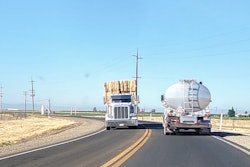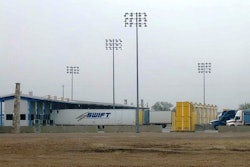Cross border freight specialist Hector Adrian Esquivel Rodriguez, known to Overdrive readers from past coverage of the gray market for MC numbers as well as one hilarious run-in with an annoying broker and a naked driver, gave advice on expanding trucking operations into Mexico at the Broker Carrier Summit in Fort Worth, Texas.
While most Mexican shippers will prefer to work with Mexican carriers and drivers for door-to-door cross-border hauling, with a potential boom in manufacturing in Mexico, many carriers at the summit felt opportunity had become too sweet to dismiss out of hand. Since 2015, Mexican carriers can haul into the U.S. and vice-versa, and Mexico was the United States’ top goods trading partner in 2023 with total two-way goods trade at $807 billion -- up significantly since before the pandemic.
Judging by the attendees at Rodriguez's "Winning Mexican Freight" learning lab, drivers might soon start seeing Mexican freight pop up on load boards if they don't secure direct freight themselves. Since the summit in October, the topic has become even more relevant: Some freight watchers predict President-elect Donald Trump's trade policies could boost cross-border freight at the Southern border particularly.

[Related: Will Trump tariff policies send freight rates skyrocketing?]
A representative from Truckstop at the session said he'd "never seen a Mexican load" on the load board, and sought to change that. TQL reps in the audience also wanted in, and Rodriguez said it was a smart play as Elon Musk quietly planned to send Tesla freight of all kinds across the border.
Rodriguez used to be a Customs and Border Protection officer working the border, and holds a CDL, which he still puts to work when the need arises. The session itself took a freewheeling, audience participation-heavy form. Rodriguez helped the crowd network and provided advice, likewise some takeaways about winning Mexican freight
Understanding cross-border regulations
"Mexico and the U.S. have different trucking regulations and standards," Rodriguez said. "Familiarize yourself with the legal requirements" of both countries, including the Federal Motor Carrier Safety Administration's regulations and guidelines of Mexico’s SCT, the Secretaría de Comunicaciones y Transportes -- essentially the nation's Department of Transportation. "This involves driver permits, vehicle safety standards, and understanding restrictions on cross-border authority."
According to FMCSA "Mexico has similar training requirements for commercial drivers but not for all hazmat employers or employees." A page with detailed info on Mexican rules, especially regarding hazmat, can be found here.
Otherwise, Mexican-licensed commercial drivers can drive in the U.S. and Canada, and U.S.-licensed commercial drivers can drive in Mexico. "Commercial drivers are required to be licensed and tested by the SCT. For U.S. drivers operating within Mexico the CDL with a hazmat endorsement is considered sufficient to meet SCT's driver training and certification requirements.
However, Mexican drivers can't do "point-to-point" hauls in the U.S. A Mexican driver must only transport international cargo, or loads that originate in or are bound for locations outside the country. For this reason, Rodriguez said "Mexican shippers want Mexican drivers to take the load door-to-door" within the U.S. "They don't want the hassle of changing trailers."
As such, U.S. carriers should get their Free and Secure Trade (FAST) card, which "allows expedited processing for commercial carriers who have completed background checks and fulfill certain eligibility requirements" to help access Mexican shippers.
"Enrolling in programs like C-TPAT (Customs-Trade Partnership Against Terrorism) and FAST can expedite processing, reduce inspection times, and demonstrate a commitment to secure, compliant cross-border operations," wrote Rodriguez in a note summarizing key considerations from the session.
Develop relationships with Mexican partners
Rodriguez got perhaps the most questions and comments on how to break into Mexican freight by forming relationships, something the crowd in Texas had lots of experience with trying, both failing and succeeding at it.
"Building partnerships with local Mexican companies can ease operations, from warehousing to last-mile delivery, and provide local expertise in navigating Mexico’s logistics landscape," Rodriguez wrote in his post-session supplement. "Local knowledge is crucial for understanding regional routes and establishing connections with Mexican regulatory bodies."
Does that mean you need to know Spanish? Not really, but you need to try.
[Related: CARB dismantled my truck, now it's hauling around Mexico]
"How much Spanish do I need to speak to do business with Mexico," asked Rodrigeuz. "Most of the guys on the shipping departments, they speak English, and if you try Spanish they will try with you."
Some in the audience said in Mexico they had found cultural norms inverted the normal corporate structures. The CEO or top brass at a company "might be someone's brother-in-law or some political commitment and they don't know $h**," said Rodriguez. "Don’t go to the CEO, go to the procurement officer who is actually on the floor loading the cargo."
Also, get comfortable schmoozing and doing some research. A guard at the gate might not let you in to talk to just whomever, but if you ask for someone by name, you have a better shot, Rodriguez said. One commenter said she had success bringing doormen candy and then asking for access. Do some research on LinkedIn or talk to people in and around Laredo, Texas, a tight-knit trucking community.
Also, Mexico doesn't have SAFER, the U.S. system to look up MCs. Vetting brokers and carriers, therefore, requires a little more on-the-ground knowledge and often requires partnership with Mexican locals, which leads right to the next point.
Understand Mexican business culture and establish a local presence
"Building trust and understanding Mexican business culture is essential," Rodriguez wrote. "Relationships are often valued over transactions, and having a physical presence, like a local office or a sales representative, can improve credibility."
Opening that local office, however, requires a bit of paperwork and some local support. To establish a company in Mexico with foreign partners, a carrier would need to file normal articles of incorporation with their names, nationality, date of birth, and passport numbers, and get set up with the Federal Taxpayer Registry in Mexico.
If the non-Mexican partner holds more than 49% of the company, the company must seek a favorable resolution from the National Foreign Investment Commission. For that reason, many carriers use locals in Mexico to hold half of the company. Ultimately, the business must submit documents to the Mexican Ministry of Economy to register its incorporation documents with the Public Registry of Commerce, so it helps to have a local to navigate the bureaucracy.
Resources for landing Mexican freight run the gamut .Rodriguez shared with the group load boards like Cargado, which he said "can help with load matching and finding cross-border opportunities."
Also check out Mexican trucking associations like CenSeCar and CANACAR, which he called "excellent sources for industry news, regulatory updates, and potential leads."
For further research, Rodriguez pointed to ProMexicoIndustry, a website that offers information about the various industries in Mexico, as well as SomosIndustra.com and ISSUU's industry news pages, which specifically map out where shippers are in Mexico.
"These resources will support lead generation, competitor research, and strategic planning," wrote Rodriguez. He encouraged people with more questions to contact him on LinkedIn.
[Related: Roads to common ground: Past, present, future of U.S.-Mexico cross-border long-haul]
More from the Broker-Carrier Summit:
**Inside the broker-carrier scrum at last week's summit
**How to beat brokers at their own game and win direct freight
**How to fight a FreightGuard or other negative review of your trucking company
**FMCSA gets an earful about bad brokers, enforcement from its 'worst critic'
**Do truckers deserve blame for getting double brokered?










